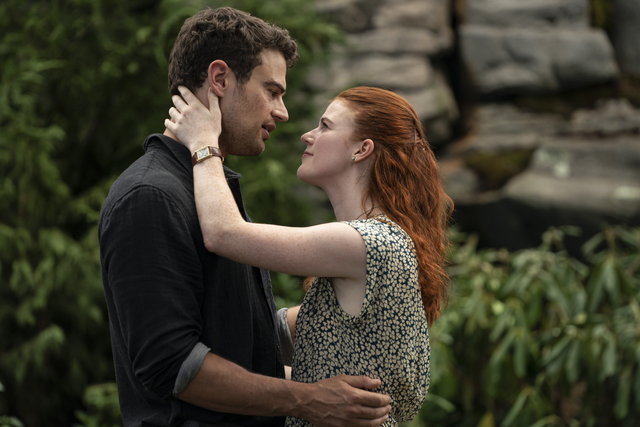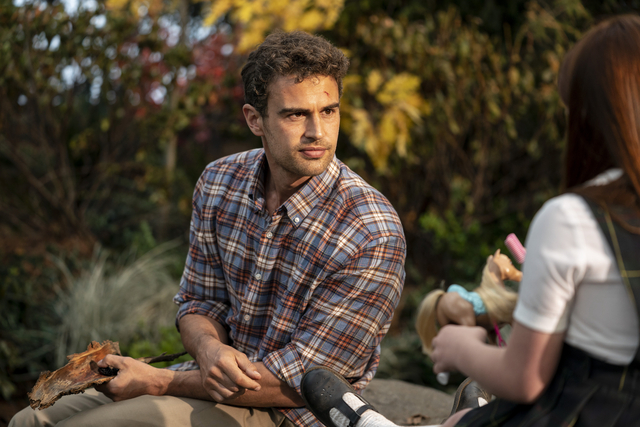One day at work, a 28-year-old librarian meets the 20-year-old woman who will become his wife. The thing is, she already knows him—knows that they will fall in love, marry, spend many happy years together—because he is a time traveler. Ever since she was a little girl, an older version of the man has been periodically journeying back through the decades to spend time with her. So she already adores him. And now, he’s younger and more attractive than she’s ever known him to be. Unfortunately, because he’s just now meeting her, he has yet to experience the true love that eased his various youthful traumas and is still a total mess of a human being.
This is the premise of HBO’s latest epic drama, The Time Traveler’s Wife. If you find it extremely confusing as described above, that’s because it is indeed extremely confusing. If, however, the summary makes even a lick of sense to you, chances are you’ve already encountered the story of Clare and her time-traveling soulmate Henry, in the form of the megahit 2003 novel by Audrey Niffenegger or the major motion picture starring Rachel McAdams and Eric Bana, from 2009. The plot has always been absurd. But after nearly two decades and one widely seen, remarkably bad adaptation, it has also aged poorly and grown redundant. It would, at this point, take a truly inspired interpretation to make a Time Traveler’s Wife series work. Sadly, this ain’t it.

It’s not hard to see why this particular adaptation, premiering May 15, might have sounded like a good idea. The show is helmed by Steven Moffat, who’s been a successful steward of time-travel series Doctor Who and, with Sherlock, Arthur Conan Doyle’s iconic detective. Aspects of Niffenegger’s narrative have become easier for audiences to wrap their minds around. Multiverses, metaverses, time travel, and sundry other scientifically questionable riffs on quantum mechanics are currently trending in Hollywood. Multiple timelines are now practically a requirement for TV dramas. Rose Leslie, a.k.a. Game of Thrones fan favorite Ygritte, plays the feisty Clare. Casting Divergent alum Theo James as Henry might draw in some viewers who were too young for The Time Traveler’s Wife in the aughts. Plus, you can show butts on HBO—which helps when one of your leads is a heartthrob who hurtles through time naked.
Many of those on-paper pros have, in practice, turned out to be cons. Yes, non-chronological storytelling is hot right now. Shows like Shining Girls, Russian Doll, and Undone (to name three that have kicked off new seasons in the past month alone) are doing sophisticated, imaginative things with time travel. But The Time Traveler’s Wife is not that. For newcomers to the Niffeneggerverse, the conceit is that due to a vague, incurable “genetic defect,” Henry spontaneously vanishes from the present and re-materializes at some point in the past. Or, much less frequently, the future. The rules of his condition seem designed to offer maximum authorial flexibility. How much significance is there to the timing of when Henry travels and where he ends up? Some, except for when there’s none. How often does he travel? Hard to say. Does he ever travel outside his own lifetime? Occasionally. Would a real person with such an affliction manage to escape getting found out and becoming a public spectacle? No way. Do matters of free will and fatalism ever get addressed in a satisfying way? Oh, absolutely not. Do Mobius-strip, chicken-vs.-egg type impossibilities emerge around the fact that younger Clare met older Henry 14 years before 28-year-old Henry met 20-year-old Clare? So many!
These aren’t the only reasons to feel ambivalent about a relationship that revolves around the supposedly romantic idea that he becomes her treasured confidant when she’s still a kid, while her love gives him something to live for as a nihilistic young adult whose habit of showing up at random places and times in his birthday suit has led him to a lifetime of injuries, arrests and sundry criminal behavior in the name of survival. But a man over 30 essentially raising his future wife, from age 6, to be his perfect partner has even more uncomfortable connotations now than it would have in 2003. The show addresses this in only the most hilariously cursory way: the term “grooming” surfaces and is left to hang in the air, an item checked off the update to-do list.

The sense that Henry and Clare’s romance might not be something to root for only exacerbates the series’ many tonal inconsistencies. This Time Traveler’s Wife often dabbles in self-aware humor—maybe to preempt nitpicking of the time-travel mechanics, and maybe in hopes of avoiding the tear-jerking excesses of the movie. But the transitions between dark drama and light comedy, sci-fi and romance, wistfulness and raunch can play more like non sequiturs. It’s silly, if never exactly what I’d call funny, that there are sometimes dozens of different-aged Henrys beaming in to the same significant moment in time. Are we supposed to laugh or cry, though, during the scene where they all converge on the most tragic event of his childhood?
The show lacks momentum, partially because its neglect to establish a fixed, forward-moving “present” creates the sense of drifting unmoored through the decades. If you put aside the grooming issue, there’s just not much that’s distinctive about the characters; Clare is brassy, Henry brooding. Both leads do a fine job on their own (though Leslie strains to convey the gravitas of older age in scenes from Clare’s gray-haired years), and both represent an improvement over McAdams and Bana, who came off as even more generic. Unfortunately, though, they don’t generate much of a spark together. If any one element could have made a decent show based on such a ludicrous premise—one unfurled largely through pretentious voiceovers and predictable twists—it would have been the chemistry between the two actors.
In the absence of even that kernel of enjoyment, all The Time Traveler’s Wife has to offer is an extended, painfully literal allegory for the bromide that true love transcends time. Maybe it’s fitting that this cliché predated the birth of any viewer by centuries and will in all likelihood survive us, too. But I’m still too lost in the whole love-inception boondoggle to say for sure.
More Must-Reads from TIME
- Cybersecurity Experts Are Sounding the Alarm on DOGE
- Meet the 2025 Women of the Year
- The Harsh Truth About Disability Inclusion
- Why Do More Young Adults Have Cancer?
- Colman Domingo Leads With Radical Love
- How to Get Better at Doing Things Alone
- Michelle Zauner Stares Down the Darkness
Contact us at letters@time.com